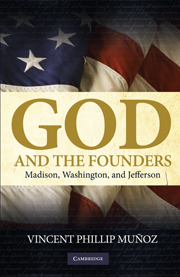Book contents
- Frontmatter
- Contents
- Acknowledgments
- Introduction: The Founders, Religious Freedom, and the First Amendment's Religion Clauses
- PART I THE FOUNDERS' CHURCH-STATE POLITICAL PHILOSOPHIES
- 1 James Madison's Principle of State Noncognizance of Religion
- 2 George Washington on Church and State: Religion and the Civic Good
- 3 Thomas Jefferson's Natural Rights Philosophy and Anticlerical Politics of Religious Liberty
- PART II THE FOUNDERS AND FIRST AMENDMENT RELIGION CLAUSES
- Conclusion: The Founders and Church-State Jurisprudence
- Appendix A “Memorial and Remonstrance against Religious Assessments” by James Madison, 1785
- Appendix B A Bill “Establishing a Provision for Teachers of the Christian Religion” by Patrick Henry, 1784
- Appendix C A Bill for Establishing Religious Freedom in Virginia by Thomas Jefferson, 1777
- Index
2 - George Washington on Church and State: Religion and the Civic Good
Published online by Cambridge University Press: 05 June 2012
- Frontmatter
- Contents
- Acknowledgments
- Introduction: The Founders, Religious Freedom, and the First Amendment's Religion Clauses
- PART I THE FOUNDERS' CHURCH-STATE POLITICAL PHILOSOPHIES
- 1 James Madison's Principle of State Noncognizance of Religion
- 2 George Washington on Church and State: Religion and the Civic Good
- 3 Thomas Jefferson's Natural Rights Philosophy and Anticlerical Politics of Religious Liberty
- PART II THE FOUNDERS AND FIRST AMENDMENT RELIGION CLAUSES
- Conclusion: The Founders and Church-State Jurisprudence
- Appendix A “Memorial and Remonstrance against Religious Assessments” by James Madison, 1785
- Appendix B A Bill “Establishing a Provision for Teachers of the Christian Religion” by Patrick Henry, 1784
- Appendix C A Bill for Establishing Religious Freedom in Virginia by Thomas Jefferson, 1777
- Index
Summary
Individuals entering into society, must give up a share of liberty to preserve the rest. The magnitude of the sacrifice must depend as well on situation and circumstance, as on the object to be obtained. It is at all times difficult to draw with precision the line between those rights which must be surrendered, and those which may be reserved… .
G. Washington, Letter submitting the proposed constitution to the President of Congress, September 17, 1787Compared with Thomas Jefferson and James Madison, George Washington's political thought regarding church and state has long been overlooked. It is commonly assumed that on matters of religious liberty Jefferson and Madison speak for the founding generation. The near-exclusive concern with Jefferson and Madison can be traced to Everson v. Board of Education (1947), in which the Supreme Court presumed, first, that the Founding Fathers shared a uniform understanding of religious freedom and, second, that Jefferson and Madison represented the Founders' view. Ever since, most historically minded constitutional scholars and judges have uncritically accepted Everson's presumptions. George Washington, however, was no less dedicated to securing religious freedom than were his second and third presidential successors. In a 1783 letter he testified that “the establishment of Civil and Religious Liberty was the Motive which induced me to the field [of battle].” Washington, moreover, offers a different understanding of the right to religious freedom than either Jefferson or Madison – who, we will attempt to show, themselves disagreed.
- Type
- Chapter
- Information
- God and the FoundersMadison, Washington, and Jefferson, pp. 49 - 69Publisher: Cambridge University PressPrint publication year: 2009

